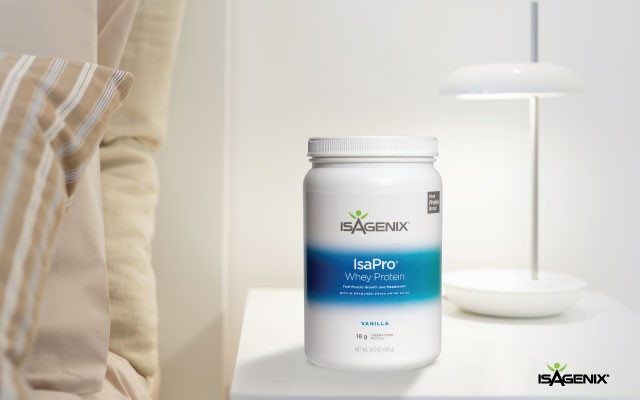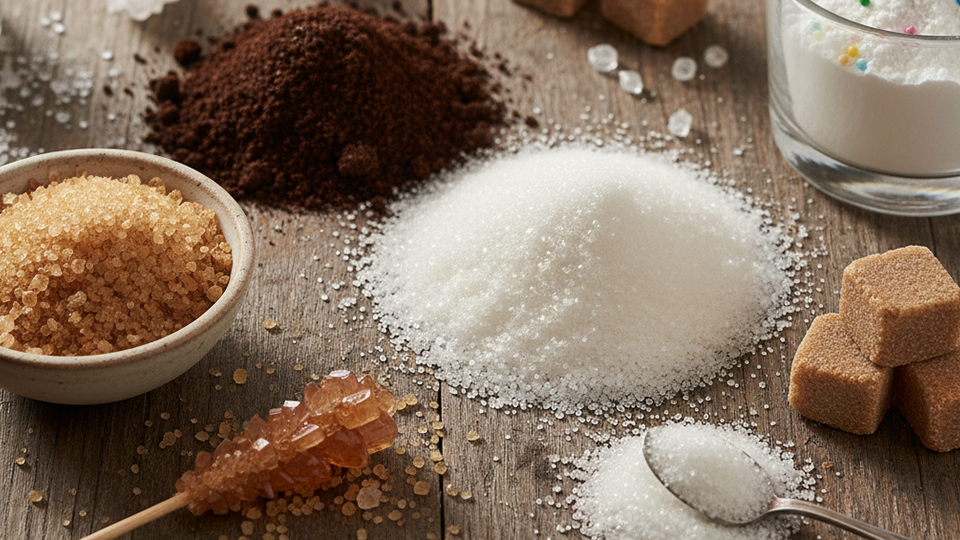If your goal is muscle growth, you may want to add a second scoop of IsaPro® to your Bedtime Belly Buster. That extra scoop would raise protein to a level consistent with studies evaluating “pre-sleep protein” for boosting muscle protein synthesis.
Muscle protein synthesis is the process the body goes through for either building or rebuilding proteins in the body. The body naturally breaks down and rebuilds muscle protein as part of normal metabolism.
When the rate of muscle breakdown and growth are in balance, the body’s muscle mass stays the same. If the rate of breakdown is greater than the rate of muscle building, then the body starts to lose muscle mass.
The key to muscle growth is for the body to consistently build more muscle protein than it breaks down, resulting in a positive net protein balance. The right combination of nutrition and exercise work together to provide optimal support for muscle growth.
33 Percent Increased Muscle Protein Synthesis
Earlier research found that pre-sleep protein maximized muscle building after evening exercise in young men (1). Additionally, pre-sleep protein had been shown to increase the overall net protein balance necessary for muscle building and growth (2).
Now a new study from the Netherlands reports that older men maximized muscle protein synthesis when they consumed 40 grams of high-quality protein prior to going to bed (3). The study, published in the Journal of Nutrition, randomized participants to either a group that consumed a supplement of 40 grams of protein, 20 grams of protein, or a placebo before sleep. The study then analyzed muscle biopsies prior to and following the protein or placebo ingestion and seven hours of sleep.
Participants who supplemented with 40 grams of protein just prior to sleep had 33 percent higher rates of muscle protein synthesis compared to supplementation with 20 grams or placebo. There was also no significant difference between those who ingested 20 grams of protein versus placebo.
The reason that scientists are interested in sleep is because it’s a critical period for muscle building and recovery. The research suggests that a snack or meal high in protein before going to bed might be a good strategy to for making the most of exercise efforts during the day.
Getting 40 Grams of Protein at Bedtime
A 40-gram dose would be equivalent to about 6 ounces of steak or chicken breast. With Isagenix products, two scoops of IsaPro or one of IsaLean Pro would provide a nearly equivalent dose at 36 grams of protein.
The latest research evaluating pre-sleep protein is also supported by recent research conducted at Skidmore College that evaluated use of Isagenix protein-rich products for improving athletic performance (4, 5). In those studies, subjects had either a protein-rich IsaLean Bar or other product that was rich in whey protein just before bed (4, 5).
Not everyone may be interested in getting 40 grams of protein before bed. If your goal is weight loss, 20 grams of protein 30-60 minutes before bed may be just the boost your metabolism needs. But If you’re looking to build muscle and strength, increasing the protein to 40 grams before bed might be the right dose for you.
References
- Snijders T, Res PT, Smeets JSJ, et al. Protein ingestion before sleep increases muscle mass and strength gains during prolonged resistance-type exercise training in healthy young men. Journal of Nutrition. 2015 Jun; 145(6): 1178-1184. doi: 10.3945/jn.114.208371.
- Holwerda AM, Kouw IWK, Trommelen J, et al. Physical activity performed in the evening increases the overnight muscle protein synthetic response to presleep protein ingestion in older men. Journal of Nutrition. 2016 Jul; 146(7): 1307-1314. doi: 10.3945/jn.116.230086.
- Kouw IWK, Holwerda AM, Trommelen J, et al. Protein ingestion before sleep increases overnight muscle protein synthesis rates in healthy older men: a randomized controlled trial. Journal of Nutrition. 2017 Aug 30. jn254532. doi: 10.3945/jn.117.254532.
- Ives SJ, Norton C, Miller V, Minicucci O, et al. Multi-modal exercise training and protein-pacing enhances physical performance adaptations independent of growth hormone and BDNF but may be dependent on IGF-1 in exercise-trained men. Growth Horm IGF Res. Oct; 24. DOI: http://dx.doi.org/10.1016/j.ghir.2016.10.002
- Arciero PJ, Ives SJ, Norton C, et al. Protein-Pacing and Multi-Component Exercise Training Improves Physical Performance Outcomes in Exercise-Trained Women: The PRISE 3 Study. Nutrients. 2016 Jun 1;8(6).





